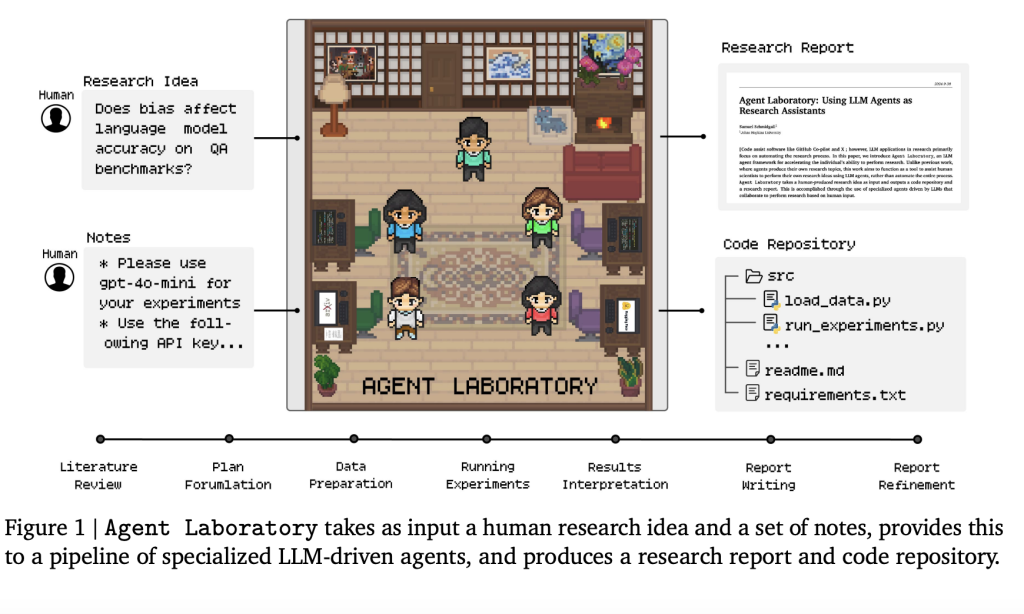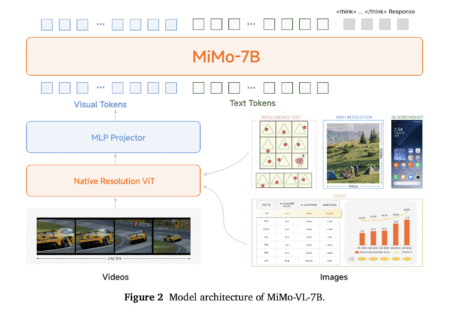

Scientific research is often constrained by resource limitations and time-intensive processes. Tasks such as hypothesis testing, data analysis, and report writing demand significant effort, leaving little room for exploring multiple ideas simultaneously. The increasing complexity of research topics further compounds these issues, requiring a blend of domain expertise and technical skills that may not always be readily available. While AI technologies have shown promise in alleviating some of these burdens, they often lack integration and fail to address the entire research lifecycle in a cohesive manner.
In response to these challenges, researchers from AMD and John Hopkins have developed Agent Laboratory, an autonomous framework designed to assist scientists in navigating the research process from start to finish. This innovative system employs large language models (LLMs) to streamline key stages of research, including literature review, experimentation, and report writing.
Agent Laboratory comprises a pipeline of specialized agents tailored to specific research tasks. “PhD” agents handle literature reviews, “ML Engineer” agents focus on experimentation, and “Professor” agents compile findings into academic reports. Importantly, the framework allows for varying levels of human involvement, enabling users to guide the process and ensure outcomes align with their objectives. By leveraging advanced LLMs like o1-preview, Agent Laboratory offers a practical tool for researchers seeking to optimize both efficiency and cost.

Technical Approach and Key Benefits
Agent Laboratory’s workflow is structured around three primary components:
- Literature Review: The system retrieves and curates relevant research papers using resources like arXiv. Through iterative refinement, it builds a high-quality reference base to support subsequent stages.
- Experimentation: The “mle-solver” module autonomously generates, tests, and refines machine learning code. Its workflow includes command execution, error handling, and iterative improvements to ensure reliable outcomes.
- Report Writing: The “paper-solver” module generates academic reports in LaTeX format, adhering to established structures. This phase includes iterative editing and feedback integration to enhance clarity and coherence.

The framework offers several benefits:
- Efficiency: By automating repetitive tasks, Agent Laboratory reduces research costs by up to 84% and shortens project timelines.
- Flexibility: Researchers can choose their level of involvement, maintaining control over critical decisions.
- Scalability: Automation frees up time for high-level planning and ideation, enabling researchers to manage larger workloads.
- Reliability: Performance benchmarks like MLE-Bench highlight the system’s ability to deliver dependable results across diverse tasks.
Evaluation and Findings
The utility of Agent Laboratory has been validated through extensive testing. Papers generated using the o1-preview backend consistently scored high in usefulness and report quality, while o1-mini demonstrated strong experimental reliability. The framework’s co-pilot mode, which integrates user feedback, was especially effective in producing impactful research outputs.
Runtime and cost analyses revealed that the GPT-4o backend was the most cost-efficient, completing projects for as little as $2.33. However, the o1-preview achieved a higher success rate of 95.7% across all tasks. On MLE-Bench, Agent Laboratory’s mle-solver outperformed competitors, earning multiple medals and surpassing human baselines on several challenges.

Conclusion
Agent Laboratory offers a thoughtful approach to addressing the bottlenecks in modern research workflows. By automating routine tasks and enhancing human-AI collaboration, it allows researchers to focus on innovation and critical thinking. While the system has limitations—including occasional inaccuracies and challenges with automated evaluation—it provides a solid foundation for future advancements.
Looking ahead, further refinements to Agent Laboratory could expand its capabilities, making it an even more valuable tool for researchers across disciplines. As adoption grows, it has the potential to democratize access to advanced research tools, fostering a more inclusive and efficient scientific community.
Check out the Paper, Code, and Project Page. All credit for this research goes to the researchers of this project. Also, don’t forget to follow us on Twitter and join our Telegram Channel and LinkedIn Group. Don’t Forget to join our 60k+ ML SubReddit.
 FREE UPCOMING AI WEBINAR (JAN 15, 2025): Boost LLM Accuracy with Synthetic Data and Evaluation Intelligence–Join this webinar to gain actionable insights into boosting LLM model performance and accuracy while safeguarding data privacy.
FREE UPCOMING AI WEBINAR (JAN 15, 2025): Boost LLM Accuracy with Synthetic Data and Evaluation Intelligence–Join this webinar to gain actionable insights into boosting LLM model performance and accuracy while safeguarding data privacy.
The post AMD Researchers Introduce Agent Laboratory: An Autonomous LLM-based Framework Capable of Completing the Entire Research Process appeared first on MarkTechPost.
Source: Read MoreÂ




